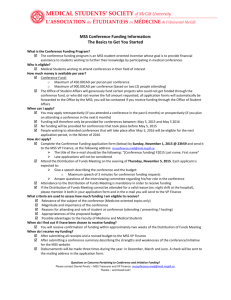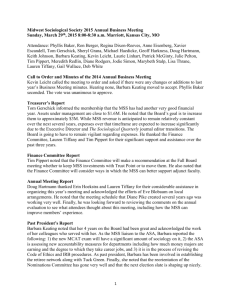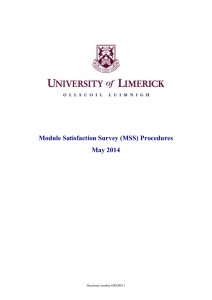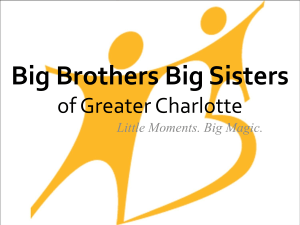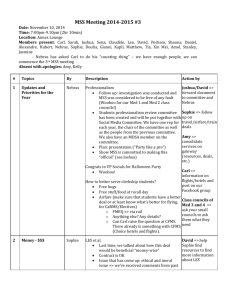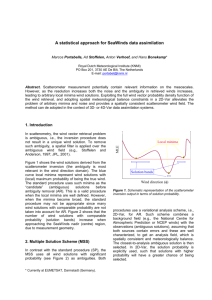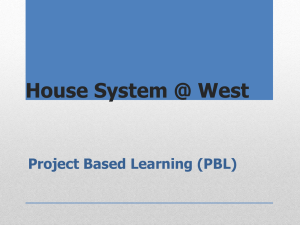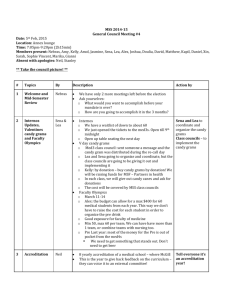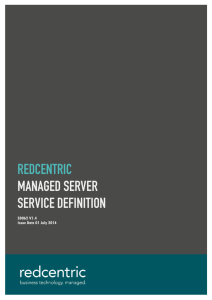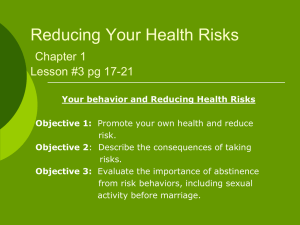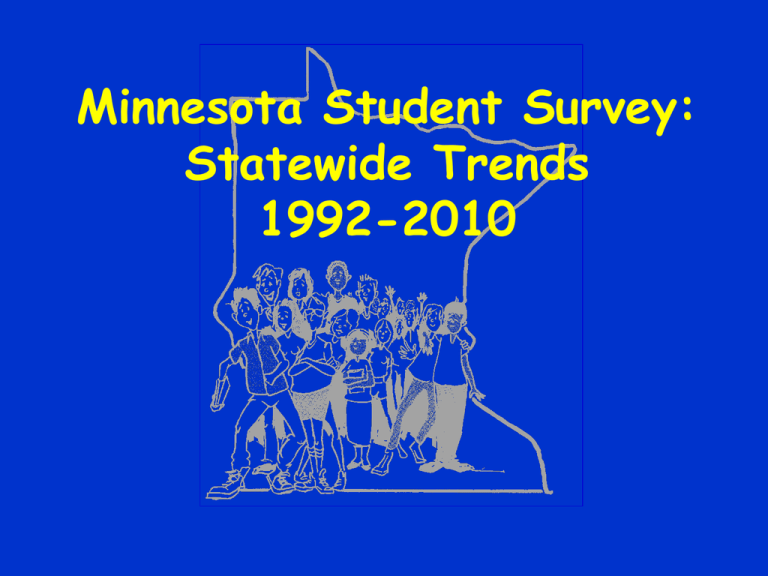
Minnesota Student Survey:
Statewide Trends
1992-2010
Purpose of the MSS
• Data for program planning and evaluation
and to meet federal requirements
• Address relevant issues confronting
students
• Mark trends over time – conducted every
3 years since 1989
• Involve schools/other educational settings
statewide and provide data for local use
2010 MSS Coordination
Partnership of 4 state agencies:
Department of Education
Department of Health
Department of Human Services
Department of Public Safety
Survey Coordination and
Administration
• Population-based survey for students
in grades 6, 9, 12 and in non-traditional
learning settings
• 2 versions of the survey
• Brief – one class period
Survey Coordination and
Administration
• Paper-pencil bubble survey
• Minimal changes to the survey
instrument since 2007
• Uniform instructions, checklist
provided – schools/facilities
administer the survey
MSS Data Tables
• State, county and non-traditional learning
settings tables may be found at:
–
–
–
–
www.education.state.mn.us
www.health.state.mn.us/divs/chs/mss/
www.dhs.state.mn.us/
www.dps.state.mn.us/ojp
• Tables are organized by subject area
rather than by the order that questions
appeared in the survey
MSS Reports
The following additional reports will
be released in 2011:
–
–
–
–
–
–
Youth in Correctional Facilities Report
Alternative Learning Settings Report
Race and Ethnicity Report
1992 and 2010 Comparison Report
Protective and Risk Factor Associations
Snapshots on Minnesota Youth
Availability of MSS Data
• State and county* level tables are on
the web and are available to anyone
• State agencies do not provide district
level results to others without the
district’s permission
• *Counties with only one participating
school district do not have their
results posted on the web
Availability of MSS Data
• Additional data runs available but not
on an unlimited basis
• MSS data sets available to agencies
for their own analysis
• Data use agreement must be put in
place before data sets are provided
Participation in the MSS
• District participation rate:
– In 2010, 295 out of 335 public school
districts participated statewide (88%)
– District participation over time:
1992: 99%
2001: 91%
2010: 88%
1995: 92%
2004: 88%
1998: 92%
2007: 91%
Participation in the
2010 MSS
• Regular Public Schools:
Statewide numbers of MSS participants
in grades 6, 9 and 12
# students
• 6th grade:
46,787
• 9th grade:
47,387
• 12th grade:
36,734
Participation in the
2010 MSS
• Non-Traditional Learning Settings:
Statewide numbers of MSS
participants in grades 7-12
# students
Alternative Schools/
Area Learning Centers:
Juvenile Correctional Facilities:
4,586
587
Participation in the MSS
• Reasons for non-participation within
participating districts
– Voluntary survey – student chose not to
participate
– Parents didn’t allow
– Student was out of school on that day or
at that time
– Drop out
Trend Data
• Trend data include only school districts
that participated all 7 times since 1992
• School district data for the 1992 – 2010
trend analysis represent 82% of all of the
students surveyed during the seven
administrations of the survey
• Sample weighting procedure adjusts for
differences in participation rates across
districts
Participation Over Time
Racial/Ethnic Identity Over Time
Topics in the Trend Presentation
•
•
•
•
•
•
•
•
Academic and School Connectedness
Perceptions of School Safety
Violent and Anti-Social Behaviors
Mental Health
Alcohol, Tobacco and Other Drugs
Other Health Behaviors
Sexual Behaviors
Families
Academics & School
Connectedness
Plan to go to college or beyond
Spend 6 or more hours in a typical week
on homework
All/most teachers are interested
in you as a person
All/most teachers show respect
for students
Perceptions of School Safety
Feel safe at school
(strongly agree or agree)
Skipped school one or more times in the
last 30 days because felt unsafe at or
on the way to school
A student pushed, shoved or grabbed
you on school property in the last 12
months
Was offered, sold or given an illegal
drug on school property in the last 12
months
Violent & Anti-Social
Behavior
Carried weapon (gun/other weapon) on
school property one or more days in
last 30 days
Hit or beat up another person one or
more times in the last 12 months
Damaged or destroyed property one
or more times in the last 12 months
Mental Health
Felt sad all or most of the time in the
last 30 days
Felt sad all or most of the time in the
last 30 days (6th grade by gender)
Felt sad all or most of the time in the
last 30 days (12th grade by gender)
Felt sad all or most of the time in the
last 30 days (9th grade by gender)
Felt discouraged or hopeless (extremely
so or quite a bit) in the last 30 days
Felt discouraged or hopeless (extremely
so or quite a bit) in the last 30 days
(6th grade by gender)
Felt discouraged or hopeless (extremely
so or quite a bit) in the last 30 days
(12th grade by gender)
Felt discouraged or hopeless (extremely
so or quite a bit) in the last 30 days
(9th grade by gender)
Tried to kill oneself in the last 12 months
Tried to kill oneself in the last 12
months (9th grade by gender)
Alcohol, Tobacco
& Other Drugs
Percent of students using chemical substances
in the last 12 months (2010 trend data file)
100.0%
Grade 9
Grade 12
75.0%
55.3%
50.0%
31.1%
30.6%
25.0%
14.9%
6.3%
3.5%
0.0%
5.4%
4.7%
3.4%
2.4%
4.5%
3.0%
3.2%
3.1% 2.4%
2.5%
2.6%2.7%
1.7%
1.5%
1.1% 1.4% 0.9%1.4%
Used alcohol one or more times in
the last 12 months
Binge drinking (5 or more drinks in a row)
in the last 2 weeks
Binge drinking in the last 2 weeks
by grade & gender
Smoked cigarettes the last 30 days
Smoked half pack or more per day
during the last 30 days
Used marijuana one or more times in
the last 12 months
Used inhalants one or more times in
the last 12 months
Used LSD/psychedelics one or more
times in the last 12 months
Used methamphetamines one or more
times in the last 12 months
Drove motor vehicles after using
alcohol or drugs in the last 12 months
Rode with friends after they have been
using alcohol or drugs
Other Health Behaviors
Physically active for 30 minutes or
more on at least 5 of the last 7 days
Five or more servings of fruits and
vegetables yesterday
Feel that they are overweight
(All students)
Feel that they are overweight
(Females)
Feel that they are overweight
(Males)
Always wears a seatbelt when
riding in a car
Sexual Behaviors
Ever had sexual intercourse
Ever had sexual intercourse
(9th Grade Only)
Ever had sexual intercourse
(12th Grade Only)
Talked with partner about STDs/HIV
(sexually active students only)
100%
75%
50%
25%
44.6%
44.6%
61.0%
54.0%
60.8%
59.9%
51.1%
45.5%
45.6%
49.7%
49.3%
44.6%
50.6%
43.9%
0%
1992
1995
1998
Grade 9
2001
2004 2007
Grade 12
2010
You or your partner used a condom the
last time you had intercourse
(sexually active students only)
100%
75%
50%
63.4%
51.2%
68.4%
60.2%
63.3%
69.8%
69.6%
54.0%
56.6%
61.5%
70.2%
62.7%
68.1%
60.9%
25%
0%
1992
1995 1998
Grade 9
2001 2004 2007 2010
Grade 12
Families
Feel your parents care about you
very much
Can talk with your mother about
problems most or some of the time
Can talk with your father about
problems most or some of the time
Alcohol use by any family member
has repeatedly caused problems
Drug use by any family member has
repeatedly caused problems
Summary of Findings
Risk Behaviors
• ATOD use decreased or was stable
• Between 1992 and 2010, all three grades
showed substantial declines in alcohol use
• Binge drinking among 12th graders showed a
notable decrease after many years of
stability
• Violent behaviors decreased or were stable
• Fewer students are driving after using
alcohol or drugs
Summary of Findings
Positive Behaviors
• Most students (over 65%) wear a
seatbelt all the time
• Less than a quarter of students eat 5+
servings of fruits/vegetables each day
• Very little change in physical activity
levels
• Talking with every partner about STDs
has declined among sex. active students
Summary of Findings
Risk/Protective Factors
• Schools are perceived as safe
• Alcohol/drug problems by family
members are stable
• Most students feel family
connectedness
• Most think teachers respect them,
but fewer think teachers are
interested in them as a person
Minnesota Student Survey
New Questions in 2007
New Questions in
2007 & 2010
• 2007: over 50 new questions were asked
• 2010: one new question was added (how
often home alone after school)
• 2010: a series of questions was changed
from peer disapproval for alcohol and drug
use to parental disapproval
Have ever had an Individualized
Education Plan (IEP)
Currently receive free or reducedprice school lunch
Alone/unsupervised after school at
least one day in a typical week
Sexual Harassment &
Bullying at School
A student touched, grabbed, or pinched
you in a sexual way on school property
in the last 12 months
A student made unwanted sexual
comments, jokes, gestures or looks
toward you on school property in the
last 12 months
Have been bullied in the last 30 days
Have bullied someone else in the last
30 days
Student Activity
Spend 6 or more hours in a typical week
talking on the phone or texting
Participate in mentoring programs at
least once per week
Top 4 Reasons Students
Participate in School or
Community Based Activities
– To have fun
• 82% - 6th; 83% - 9th; 85% - 12th
– To learn new skills
• 56% - 6th; 50% - 9th; 46% - 12th
– My friends participate
• 38% - 6th; 49% - 9th; 46% - 12th
– To help me get into college
• 21% - 6th; 40% - 9th; 39% - 12th
Dating Violence
Have ever physically or sexually hurt
someone you were going out with
Someone you were going out with ever
hit, threatened or made you feel afraid
Someone you were going out with ever
forced you to have sex or do something
sexual when you didn’t want to
Physical & Mental Health
Ever been told you have asthma
Have a physical health condition that has
lasted at least 12 months
Have a mental or emotional health problem
that has lasted at least 12 months
Have ever been treated for a mental or
emotional health problem
Weight status based on Body Mass Index
Emotional Well-being/Distress
• A series of questions developed for
use by DHS in creating an index
• Questions include:
– I get a lot of headaches, stomachaches
or sickness
– I often have trouble getting to sleep and
staying asleep
– I am often irritable and angry
I do things before I think
(agree/mostly agree)
I am often unhappy, depressed or tearful
(agree/mostly agree)
Have ever hurt oneself on purpose
Have gambled online in the last 12
months
Alcohol, Tobacco &
Other Drug Use
Smoked cigars, cigarillos or little cigars at
least once in last 30 days
Used any tobacco product in the last
30 days
Age at first alcohol use
Age at first marijuana use
Used stimulants in last 12 months
Used ADHD or ADD drugs to get high
in the last 12 months
Used pain relievers to get high in the
last 12 months
Used tranquilizers to get high in the last
12 months
Have talked with at least one parents about
dangers of tobacco, alcohol, or drug use in
the last 12 months
Parental disapproval of smoking one or
more packs of cigarettes a day
Parental disapproval of drinking alcohol
Parental disapproval of smoking marijuana
Parental disapproval of using other illegal
drugs
Recommendations
• Continue intensive and comprehensive
prevention efforts to sustain recent
improvements
• Pay close attention to illegal
prescription drug use among older
adolescents
• Continue emphasis on binge drinking
and pay attention to alcohol use
among adolescents
Recommendations
• Continue prevention programs
focused on wearing seatbelts, healthy
eating and exercise, as well as on
risks of unprotected sexual behavior
and driving after substance use
• Celebrate and further explore family,
school and community supports
Questions & Answers
THANK YOU!

